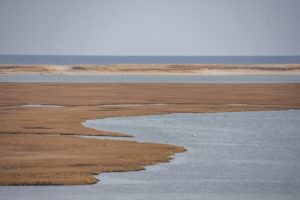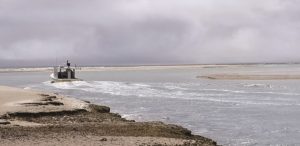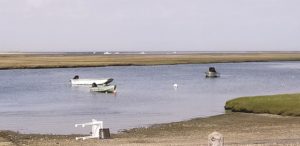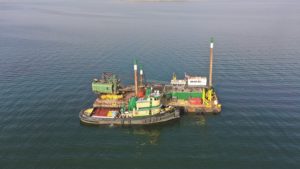EASTHAM — At a joint meeting with the Orleans Select Board on Dec. 13, the Eastham Select Board voted unanimously to pull out of the Nauset Estuary Dredge permitting process. That leaves the future of the project, which has been in the works since 2015, uncertain.
All five Eastham board members expressed concerns about sharing the cost of the $3.1-million project without sufficient economic data showing how their investment in the water economy would pay off.
“We’re talking about a multi-million-dollar project over a number of years,” said the Eastham board chair, Art Autorino. “But there’s nothing that says, ‘Here’s the economic benefit, here’s what you’re going to save.’ ”
A memorandum of understanding (M.O.U.) signed by the towns in May stipulated that both towns would produce a study detailing the economic benefits of the dredging, but that never materialized.
Meanwhile, the M.O.U. established that Orleans would pay for the cost of permitting the project. Since 2016, Orleans has spent $670,000 for permit-related work done primarily by Woods Hole Group, an environmental engineering firm in Bourne. Townspeople committed another $160,000 for that effort at last spring’s town meeting.
The agreement gave Eastham the right to back out of the permitting process. And it appears unlikely that the permitting could go forward successfully without Eastham on board.
“I don’t think it would get very far without Eastham on that permit,” said select board member Aimee Eckman of Eastham, a longtime opponent of the project.
Aiding Fishermen
Shoaling has made the estuary channels difficult to navigate, especially when the tide is low. As a result, lobstermen have to keep their boats moored near the inlet, using skiffs to bring in fuel and other supplies.

Garrett Loparto, a second-generation lobsterman and Eastham resident, said it’s impossible to get his boat, a 33-footer, into Town Cove without “the highest freakin’ tide.”
In 2018, Orleans commercial fishermen brought in a collective catch worth $2.66 million, according to the Mass. Div. of Marine Fisheries. In Eastham, the catch was worth $1.25 million.
The dredging project would deepen the channel behind Nauset spit, the long, sandy barrier protecting Nauset Marsh. Two smaller dredging operations would deepen and widen the channels to Priscilla Landing and Mill Pond. The entire project would move 155,560 cubic yards of sand and silt, more than the Barnstable County Dredge relocated in all of 2021. Maintenance dredging would be required every year behind the barrier beach and every 8 to 15 years in the other areas, according to the town of Eastham website.
Proponents believe the dredging will benefit commercial fishermen and water-based businesses like Goose Hummock Shops, the recreational outfitters. They also believe it will improve water quality for aquaculture in the estuary.
Eastham Select Board member and oyster farmer Jared Collins said he understood why Orleans wanted to support the project. “Stationed at Collins Landing, I’ve seen basically every shellfish person move out and move their vessels to Hemenway or sell things completely,” Collins said. “I feel for the people who now have restricted times to get in and out and the inconvenience of having to moor their boats in different places.”
Protecting Private Property
Eastham Town Administrator Jacqui Beebe brought up Eastham’s low-lying waterfront property owners at the Dec. 13 meeting, saying they depend on the barrier beach for protection. “The total amount of assessed value of those properties is $82,660,200,” she said.
Beebe said Eastham had a responsibility to protect its property owners. “If we do something that impacts this barrier beach and the barrier gets smaller and the marsh goes away, then those property owners are at the risk of the ocean,” she said.
“The assessed value of your two big businesses,” she told the Orleans board, referring to Goose Hummock Shops and Nauset Marine, “is $1,000,693.”
What About Safety?
One purpose of the project is to enhance safety and navigability for commercial and recreational users of the inlet. But Eastham and Orleans officials disagree on the need from that point of view.
At the Dec. 13 joint meeting, Eckman dismissed the dredging as a safety project and said that Eastham’s first responders “can get to anybody” on the water.
At a public forum in June, Eckman contended that, because the dredge would not touch Nauset inlet itself, it would not help first responders reach people in open water.
At that time, Nate Sears, the Orleans harbormaster, disagreed, responding, “You can probably monkey around on the sandbars, but you’re not going to get anywhere in a hurry.”
When it comes to the possibility that the permits could go forward without Eastham on board, the issue of safety is important, said Orleans Town Administrator John Kelly at the Dec. 8 meeting of the Orleans Select Board. That’s because the Cape Cod National Seashore, which also owns land that would be dredged, will not sign off on permits for an economic improvement project.
A Tough Decision
When it came time to vote, Eastham board members Al Cestaro and Collins each paused for several seconds before joining the rest of the board and backing out of the project.
“I feel for everyone, but ultimately it’s the cost,” said Collins. “I don’t think the constituency in this town is going to go for it.”
Cestaro, who is a fisherman, said Eastham has a number of other costly infrastructure projects on the horizon, including wastewater management and a Route 6 redesign.
“Nauset Harbor has been an economic asset for 400 years,” said Orleans Select Board Chair Meff Runyon. Runyon asked that the permitting process continue and suggested that a final decision on the dredging itself should wait until both towns signed off on permits and more data is gathered.
But Beebe said that extending the process would only make it harder for Eastham to pull out. “Let’s be really honest,” she said. “When you apply for a permit, you are saying, ‘We want to do this, and this is how we want to do it.’ It is a commitment.”
One other element of the M.O.U. between the towns: it gave Eastham the right to “comprehensively deny any dredging activities within the Town of Eastham boundaries.” Some of the dredging is set to take place on Eastham land and would require approval from the Eastham Conservation Commission.
When asked by a member of the Orleans board whether they would exercise their right to deny permits for dredging within town boundaries, none of the Eastham officials responded.
When the Orleans Select Board met on Dec. 15, two days following their joint meeting with the Eastham board, the possibility of terminating the dredge project was raised. Kelly told the board that the Woods Hole Group was being paid on a step-by-step basis, so only a small closeout bill would be due.
The board decided to table a decision until Jan. 5, but Kelly gave the project a gloomy prognosis.
“The voters were told that Eastham was cooperating with the project, but that we were funding it,” he said. Now, he continued, “you’re potentially working against not only the financial but the political side as well. And that seems to be where we’re at now.”





